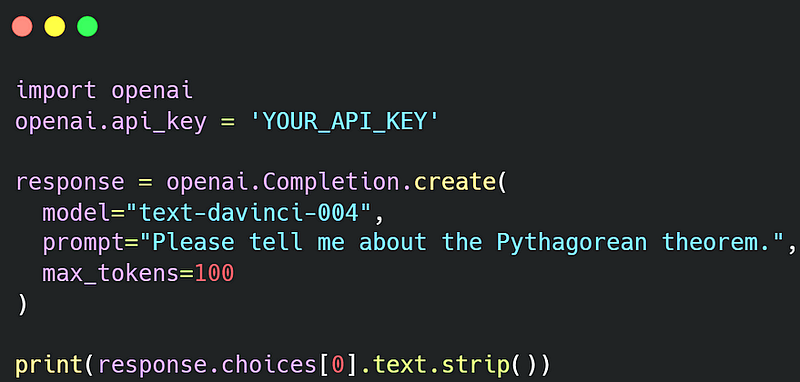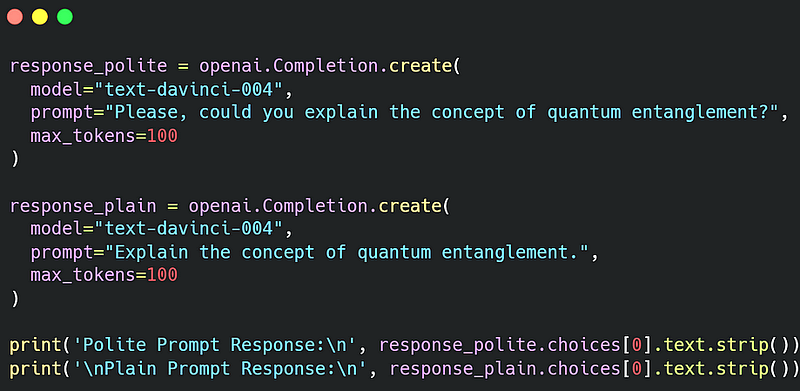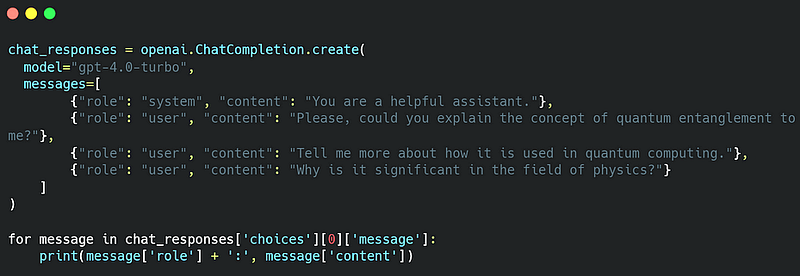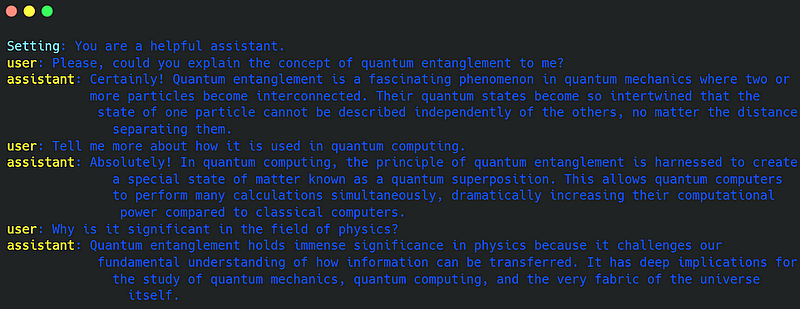Exploring the Impact of Politeness on GPT-4's Responses
Written on
Understanding Politeness in AI Interactions
Politeness extends beyond mere social conventions; it serves as a foundational element of effective communication, highlighting respect and mutual understanding. This article delves into the significant role of polite expressions, such as "please" and "thank you," in shaping the outputs generated by OpenAI's GPT-4. By analyzing both immediate and long-term effects, we aim to illuminate the intricate relationship between politeness and AI dialogue, while also forecasting future developments.
Immediate Effects of Politeness
The advanced architecture of GPT-4 enables it to grasp the subtleties of polite language used in prompts, which can influence its immediate outputs. Consider the following Python example:

When utilizing a valid API key, this code might produce an output like: "The Pythagorean theorem is a fundamental principle in geometry, stating that in a right-angled triangle, the square of the length of the hypotenuse (the side opposite the right angle) is equal to the sum of the squares of the lengths of the other two sides. This theorem, attributed to the ancient Greek mathematician Pythagoras, is essential for calculating distances and angles in various fields, including architecture, navigation, and physics." This represents a standard interaction—question posed, answer received.
Now, let’s examine how a simple addition of the word "please" can transform the interaction into a more engaging one. By incorporating a polite request, GPT-4 tends to provide a more courteous and detailed response, effectively reflecting the tone of the prompt.
To illustrate this variation, we compared outputs generated from the same query—one featuring polite language and the other devoid of it:

Polite Inquiry A possible output from a polite prompt might read: "Certainly! Quantum entanglement is a fascinating phenomenon in quantum mechanics where two or more particles become interconnected, such that their quantum states cannot be described independently of one another. This connection persists regardless of the distance separating them, even if they are light-years apart." In contrast, a straightforward prompt could yield: "Quantum entanglement refers to a phenomenon where two or more particles become entwined such that their quantum states cannot be described independently of one another, regardless of the distance between them." While both responses provide thorough explanations, the one derived from the polite prompt possesses a warmer, more inviting tone. Such subtle differences can significantly enhance user experience by fostering a more personable interaction.
Long-term Implications of Politeness
The long-lasting effects of politeness become apparent when considering GPT-4's context window, which encompasses approximately 2048 tokens (or around 2-3 pages of text). This context allows the model to sustain conversational flow and tone, meaning that politeness in initial prompts can dictate the entire trajectory of the dialogue.
To explore this further, we will conduct an experiment using the ChatGPT API, starting with polite prompts and then transitioning to neutral ones. Our hypothesis suggests that the courteous tone set at the beginning will persist throughout the interaction, resulting in a more engaging user experience.
Experimenting with Sustained Politeness
For this investigation, we will employ the openai.ChatCompletion.create() function, ideal for multi-turn conversations with GPT-4. The approach involves crafting a series of messages, categorized by 'role' (either 'system', 'user', or 'assistant') and containing the message text.

The dialogue commences with a courteous request, establishing a tone of respectful interaction. We then proceed with neutral prompts. The generated responses should, theoretically, maintain the initial polite tone. Here’s an example of the output:

From this output, it's evident that the tone of courtesy is sustained throughout the conversation, supporting our hypothesis that an initial polite tone sets the course for subsequent interactions.
Implications and Future Predictions
The effects of politeness on GPT-4's responses present intriguing implications for human-AI communication. As demonstrated, polite language in prompts not only modifies immediate replies but also influences the overall tone of extended dialogues, enhancing user experience by making it more personal.
Moreover, this underscores GPT-4's remarkable capability to adjust its tone based on conversational cues, mirroring the nuanced communication patterns observed in human interactions. The degree of empathetic responsiveness exhibited by GPT-4 indicates significant advancements in equipping AI with emotional intelligence.
As AI technology continues to progress, it is likely that future models will possess even more refined abilities to detect and respond to subtle social and emotional cues, paving the way for highly personalized and emotionally aware AI assistants.
The integration of courteous dialogue can also promote the democratization of AI, fostering more user-friendly interactions that transcend cultural and demographic boundaries. Politeness serves as a universal language of respect and understanding, and thus, embedding this quality within AI can be a pivotal step toward creating technology that is more inclusive and relatable.
In conclusion, while the technical capabilities of AI are essential in pushing boundaries, it is the subtle incorporation of human-like qualities, such as politeness, that truly enhances user experience. As we continue our journey of innovation, merging technical advancement with empathetic understanding will guide us toward creating AI that is not only intelligent but also engaging and relatable.
In this video titled "GPT-4 Prompt Engineering: Why This Is a BIG Deal!", we explore the significance of prompt design in enhancing AI interactions.
The second video, "GPT-4 Prompt Engineering: The 'Rate This' Prompt," dives into specific examples of how prompt phrasing can shape responses.